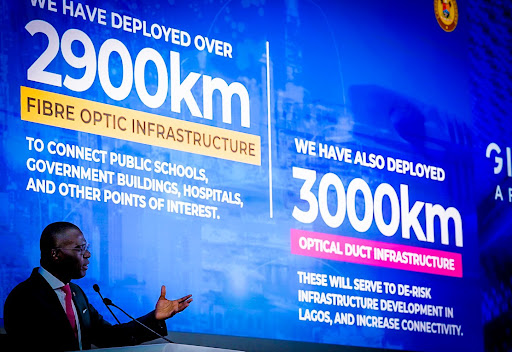Africa’s tech startup ecosystem is experiencing rapid growth and attracting significant investments. Over the past two years, the number of tech startups in Africa has increased by 40%, while investments into the sector have surged from $1.3 billion in 2019 to $4.85 billion in 2022, reflecting investor confidence in the region’s potential.
The rise of Lagos
Amid this digital evolution, Lagos state has emerged as a frontrunner, capturing global attention and investor interest. “Lagos State is at the forefront of Africa’s digital transformation,” Governor Babajide Sanwo-Olu declared in his keynote address at the recently-concluded GITEX Africa. “This emphasises the region’s pivotal role in shaping the continent’s tech narrative with strategic initiatives to propel Lagos State’s tech ecosystem to unprecedented heights,” he added.
According to Disrupt Africa, startups based in Lagos accounted for over 87% of total tech startup funding in Nigeria as of 2022, solidifying the city’s position as the epicentre of the country’s tech scene. In 2022, the startup ecosystem in Lagos is ranked 82 out of 100 globally, from 41 the previous year, according to StartupBlink Global Startup Ecosystem Index 2023.
The ascendancy of Lagos as an African tech powerhouse can be attributed to two key factors. Firstly, the number of tech hubs in the city has grown from 10 to 85 in five years. These hubs provide a collaborative space for entrepreneurs, innovators, and investors. Secondly, Lagos boasts a large pool of tech talent, with 67% of Nigeria’s developers choosing to stay in the city, as reported by a survey conducted by DevCenter. This concentration of skilled professionals fuels the local industry and attracts investments from across the world.
Building the future
The Sanwo-Olu-led government of Lagos is seeking to consolidate the state’s status as the foremost tech ecosystem in Africa. One way the administration is doing this is through its equity-free investments in startups, and its support for R&D initiatives in tertiary institutions. Startups such as Farmz2u, a Techstars-backed agritech venture, WellaHealth, Pricepally and GIVO are beneficiaries of the Lagos State Science Research and Innovation Council (LASRIC) fund. Others include DOCi Healthcare, SolidLab, Adire Lounge, Celloop, Retreasure, Brickify, Scrapays, Amjurose, ThinkBikes, STEM METS, TeensCanCode, Terawork, SHIFA Technologies among others. The Science Research and Innovation Council has also driven and supported R&D projects with institutions like the University of Lagos, Lagos State University of Science & Technology, Yaba College of Technology and others. Some of the R&D projects include the use of Convolutional Neural Networks (CNNs) for viral load detection in medical images and the Conversion of Sargassum seaweed microalgae into multiple uses including alternative plastic replacement.
According to Olatunbosun Alake, special adviser to the Lagos State governor on innovation and technology, the government has launched its own venture capital fund that is a fund of funds which will help derisk innovation funding at the very early stages for Nigerian startups. “The Lagos state government’s commitment to providing substantial support to the thriving startup ecosystem underscores its dedication to drive innovation and foster a favorable environment for entrepreneurial growth,” said Olatubosun.
Lagos state is also focusing on cybersecurity, data privacy, and consumer protection to reinforce its role as a driving force for technological advancement across the continent. Lagos as a sub-national government is domesticating the Nigeria Startup Act and implementing supportive regulations. “We recognise the transformative power of the technology ecosystem and its ability to drive inclusive growth by injecting capital into the tech sector, propelling job creation, economic development, and unprecedented growth,” Sanwo-Olu emphasized.
Removing obstacles
However, as Lagos state embarks on its journey as a tech powerhouse, it faces significant challenges. Robust internet connectivity, reliable power infrastructure, and security, which are part of the pillars of a thriving digital economy, still need to be improved in Lagos. Given these existing infrastructural limitations, the government is confronting them head on. Over the past 24 months, Lagos State has been expanding on its Metrofibre Project: about 2900km of fibre optic cable has been deployed connecting multiple points of interest.
A significant duct infrastructure has also been deployed to help derisk private sector investment in the internet connectivity market. This will increase internet connectivity to almost double digit rates in the coming years. “We are aware of the challenges we face regarding power and internet connectivity,” stated the Gov. Sanwo-Olu. “And we are actively working on improving these critical infrastructure elements to unlock the full potential of our tech ecosystem,” he added.
Lagos state has also been at the forefront of the power sector reform. It helped push the national legislation for the decoupling of power from the federal government and on its own pushed its own power sector reform through the Lagos State House of Assembly. This will allow significant investment into the power sector in Lagos.
The Lagos State Innovation MasterPlan also takes a comprehensive approach to addressing Innovation and Technology enablement in the State. The government aims to enhance the state’s tech ecosystem through infrastructure development, public-private partnerships, regulatory reforms, capacity building, and progress monitoring.
Projections indicate that with sustained investments and infrastructure improvements, Lagos state’s digital economy will contribute about 40% to Nigeria’s GDP and increase job creation in the tech sector by 30%, according to Stears Insights.
Lagos state’s journey towards reaching its digital economy ambitions is underway as it aims to lead Africa’s tech revolution by prioritizing digital policy initiatives.




















